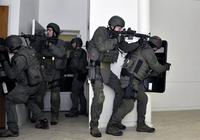-
France to offer counter-terrorism support to Libya
French Foreign Minister Laurent Fabius has confirmed that France is considering providing Libya additional aid in counter-terrorism and police training. Since the NATO-supported revolt removed Muammar Gaddafi from office two years ago, Libya has not had an effective central government, and the country has turned into a battleground for rival militias and al Qaeda-linked militants.
-
-
Security agencies concerned about plastic guns
The Undetectable firearms Act of 1988, which makes it illegal to manufacture, import, sell, ship, deliver, process, transfer, or receive a firearm which is not detectable by walk-through metal detection, is set to expire on 9 December 2013. If Congress fails to reauthorize the law, plastic guns will no longer require metal components which are detectable by metal detectors. “When these 3D firearms are manufactured, some of the weapons can defeat normal detection such as metal detectors, wands, and it could present a problem to public safety in a venue such as an airport, an arena, a courthouse,” says ATF assistant director Richard Marianos.
-
-
A civilian may be appointed to head the NSA
The Obama administration is considering appointing a civilian to lead the National Security Agency (NSA). If carried out, the move would install a civilian to lead the agency for the first time since its founding in 1952. Keith Alexander, the current director of the NSA, is a four-star Army general. He plans to retire next spring.
-
-
Sticks over carrots: the rationale of Assad’s counterinsurgency “madness”

Counterinsurgency (COIN) efforts by the West, particularly over the past decade, have emphasized the limitation of violence and the importance of the local population. Western COIN practice focuses on establishing the perception of state legitimacy in the area around which the insurgency is taking place. The objective is to sway influence away from the insurgents and towards the regime by providing security, services, stability and growth. By contrast, Syrian efforts in counterinsurgency have not only avoided securing the civilian population, but have actively targeted it. Whereas Western COIN prioritizes “the people,” the Syrian strategy focuses on the elimination of the militant opposition regardless of the collateral violence. Assad’s “enemy-centric” approaches to counterinsurgency utilizes intense violence — targeting of refugees, schools, hospitals, and using chemical weapons — to divide public support from the insurgency by punishing the civil population.
-
-
GAO says TSA’s costly behavioral detection program falls short
The Government Accountability Office(GAO) said last week that DHS may have wasted $1 billion on the Transportation Security Administration’s (TSA) Screening of Passengers by Observation Techniques (SPOT) program. SPOT aims to spot terrorists by detecting “anomalous” or suspicious behavior. The anomalous behavior – perspiration, fidgeting, restlessness – is supposed to be the result of high levels of stress, fear, or deception. Individuals who exhibit anomalous behavior are subject to additional security screening.
-
-
Local enforcement of immigration law does not achieve intended goals
A new study found that when local law enforcement agencies begin to inquire immigrants about their immigration status, some immigrants relocate within the United States but few go back relocate to their home country. Those who move to other states tend to be educated – and legally in the United States. The only exception is Arizona’s Maricopa County — which made a name for itself owing to Sheriff Joe Arpaio’s controversial approach to immigration policies — where immigrants are likely to leave the country, perhaps due to unusually intense enforcement and a short distance to the border.
-
-
Ohio lawmakers want to limit use of drones by law enforcement
State lawmakers in Ohio want to limit the use of drones by law enforcement agencies in the state.A proposed bill would require law enforcement to obtain a search warrant before using drones. It would prohibit law enforcement from using drones to search for missing persons, locate illegal marijuana operations, or perform several actions officers currently handle with helicopter surveillance.
-
-
U.S. designates Nigeria’s Boko Haram a foreign terrorist group

The State Department on Wednesday designated the Nigerian Islamist group Boko Haram as a foreign terrorist organization. The designation makes it possible for the United States to freeze the assets of the organization and its leaders and members, impose travel bans on members of the group, and prohibit Americans from offering material support to the organization. The department also designated Ansaru, a Boko Haram splinter faction, as a foreign terrorist organization. The United States says the designation would help the Nigerian government in fighting the growing threat of domestic Islamist terrorism.
-
-
Rochester, Minn. wants to stop crime before it happens
The Rochester Police Departmentin Rochester, Minnesota is using IBM’s Infosphere Identity Insightto predict, and combat, crime. InfoSphere Identity Insight is used to identify frequent crime offenders, and even when multiple false identifications belonging to one individual are stored on record, the associated relationships of those identities could lead to the correct individual.
-
-
Sequestration already eroding U.S. research capabilities
As congressional budget leaders continue negotiations over Fiscal Year 2014 spending levels, three organizations representing the U.S. leading public and private research universities say that the results of a new survey reveal the pernicious impact of sequestration on scientific research across the country. Budget cuts have already led to fewer grants, cancelled projects, staff reductions, and reduced learning opportunities. “If Congress fails to reverse course and doesn’t begin to value investments in research and higher education, then the innovation deficit this country is facing will worsen as our foreign competitors continue to seize on this nation’s shortfall,” the leader of one of the organizations said.
-
-
Illegal population flows and African security
FOI, the Swedish research institute, brought together scientists and experts from a number of countries to take part in a one-day conference at Medelhavsmuseet in Stockholm on illegal population flows and their consequences in Africa.
-
-
Advanced police surveillance technologies pose significant privacy concerns

Much of the attention on surveillance in the media focuses on the National Security Agency (NSA), but there is not a lot of scrutiny on local domestic surveillance. In 1997, about 20 percent of police departments in the United States used some type of technological surveillance. By 2007, that number had risen to more than 70 percent of departments. Experts in criminal law and information privacy warn that the widespread use of advanced surveillance technologies such as automatic license plate readers, surveillance cameras, red light cameras, and facial recognition software by state and local police departments, combined with a lack of oversight and regulation, have the potential to develop into a form of widespread community surveillance, which ought to pose significant privacy concerns to law-abiding citizens.
-
-
DHS: conspiracy theories about DHS purchases unequivocally false

Conspiracy theorists have pointed to several DHS solicitations for gear and ammunition as “proof” that the department is in the process of creating, training, and equipping a secret force, the purpose of which would be to suppress public dissent – or worse: one blogger wrote that “Another possible conclusion [regarding DHS’s ammo purchases] is that the bullets are intended to coerce and, if need be, kill us.” DHS flatly rejects these conspiratorial assertions as unequivocally false, saying that each and every purchase is in line with past purchases and in support of on-going, legitimate, and transparent departmental operations.
-
-
Kenya, Somalia to create joint anti-terrorism task force
Al-Shabaab’s attack on the Westgate shopping mall in Nairobi last month has prompted security officials in Kenya and Somalia to consider the creation of a joint task force which will share intelligence, monitor activity, and track finances relating to terrorist groups operating in East Africa. Also under discussion is the establishment of a joint East African paramilitary force with jurisdiction throughout the region.
-
-
War experiences harden group alliances
War is hell, and according to new research, experiencing its horrors can cause people to have a greater affinity for members of their own group, particularly if they are exposed to warfare in early adulthood or later in childhood. The researchers say that these effects have the potential to explain why conflict sometimes leads to cycles of war and sometimes stimulates nation-building in its wake.
-
More headlines
The long view
Factories First: Winning the Drone War Before It Starts
Wars are won by factories before they are won on the battlefield,Martin C. Feldmann writes, noting that the United States lacks the manufacturing depth for the coming drone age. Rectifying this situation “will take far more than procurement tweaks,” Feldmann writes. “It demands a national-level, wartime-scale industrial mobilization.”
No Nation Is an Island: The Dangers of Modern U.S. Isolationism
The resurgence of isolationist sentiment in American politics is understandable but misguided. While the desire to refocus on domestic renewal is justified, retreating from the world will not bring the security, prosperity, or sovereignty that its proponents promise. On the contrary, it invites instability, diminishes U.S. influence, and erodes the democratic order the U.S. helped forge.
Fragmented by Design: USAID’s Dismantling and the Future of American Foreign Aid
The Trump administration launched an aggressive restructuring of U.S. foreign aid, effectively dismantling the United States Agency for International Development (USAID). The humanitarian and geopolitical fallout of the demise of USAID includes shuttered clinics, destroyed food aid, and China’s growing influence in the global south. This new era of American soft power will determine how, and whether, the U.S. continues to lead in global development.
Water Wars: A Historic Agreement Between Mexico and US Is Ramping Up Border Tension
As climate change drives rising temperatures and changes in rainfall, Mexico and the US are in the middle of a conflict over water, putting an additional strain on their relationship. Partly due to constant droughts, Mexico has struggled to maintain its water deliveries for much of the last 25 years, deliveries to which it is obligated by a 1944 water-sharing agreement between the two countries.
How Disastrous Was the Trump-Putin Meeting?
In Alaska, Trump got played by Putin. Therefore, Steven Pifer writes, the European leaders and Zelensky have to “diplomatically offer suggestions to walk Trump back from a position that he does not appear to understand would be bad for Ukraine, bad for Europe, and bad for American interests. And they have to do so without setting off an explosion that could disrupt U.S.-Ukrainian and U.S.-European relations—all to the delight of Putin and the Kremlin.”
How Male Grievance Fuels Radicalization and Extremist Violence
Social extremism is evolving in reach and form. While traditional racial supremacy ideologies remain, contemporary movements are now often fueled by something more personal and emotionally resonant: male grievance.
